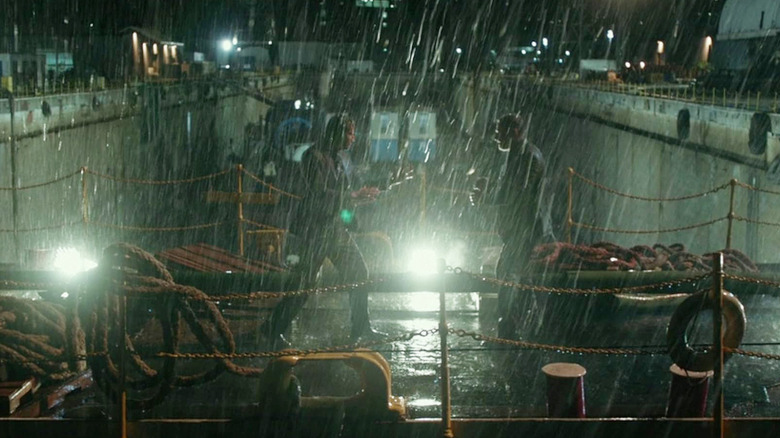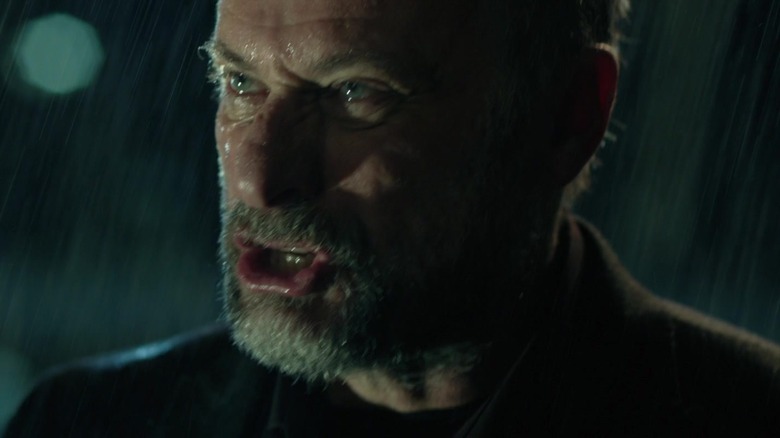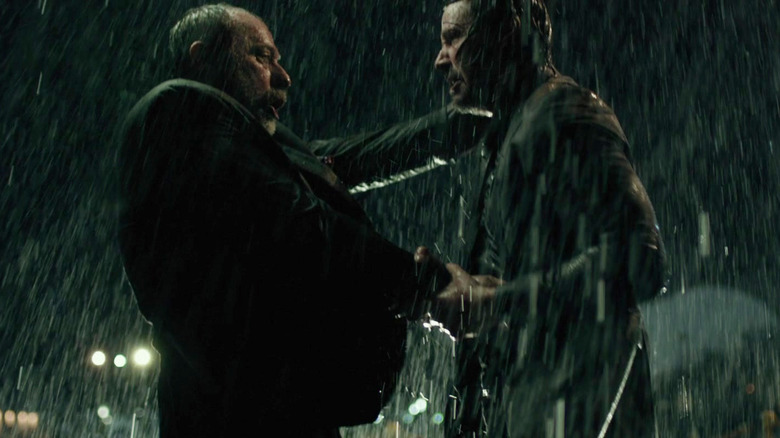Why John Wick's Directors Cut Out A Major Chunk Of The Film's Finale
The central appeal of Chad Stehlski's and uncredited co-director David Leitch's 2014 shoot-'em-up "John Wick" is how lean it is. The premise is simple, and the action is muscular. Even the plot is no more complicated than any number of zero-budget B-movies from across cinema history; a former assassin, grieving the death of his wife, is besieged by arrogant Russian gangsters. When the gangsters kill his pet puppy — the final gift his dead wife gave to him — he reactivates, seeking revenge on the men who added another spoonful to his already overwhelming sadness. It helps that the former assassin in question was played by Keanu Reeves, an actor who is an expert in playing stoic, angular action heroes.
There is one high-concept wrinkle in "John Wick," and that's the Continental Hotel. It seems that in John Wick's world, assassination is a lucrative career and it has given rise to an entire assassination industry, complete with its own assassin-only hotel that will provide killers with nice meals, high-end suits, and, naturally, all the guns and ammo they need. The rest of the movie merely plays out the way any action film ought to, with fighting and shooting sequences so impressive that it stands apart from its genre peers.
The "John Wick" sequels quickly vanished up their own posteriors with expanded mythologies and complications, leading to a "Chapter 4" — the series' "Götterdämmerung" — which was three full hours long. The leanness, it seems, didn't last long.
And indeed, the first film was originally going to be a little longer. Speaking on the home commentary track for "John Wick: Chapter 2," Stahelski and Leitch revealed they wanted the final fight of the first "John Wick" to be a lot longer. Ultimately, however, the story won out.
'It was really time for Viggo to meet his maker.'
As described, the central beef in "John Wick" is between John and the man who killed his dog, an arrogant, wealthy twerp named Iosef (Alfie Allen). As it so happens, Iosef's father is a dangerous Russian gangster named Viggo (Michael Nyqvist) who used to hire John Wick. John, it seems, is so aggressively determined to kill Iosef that he risks alienating Viggo, a dangerous prospect indeed. By the gangster's code, when Viggo hears that John is coming for his son, Viggo takes his son's side, putting out a hit on John and doing everything he can in his power to stop the unstoppable assassin. Viggo and John would eventually confront each other.
Based on Stahelski's and Leitch's comments, the original climax for "John Wick" would have seen the antihero murdering dozens of bad guys just to get to Viggo. Then, they said, Viggo himself would fend off John Wick for a sustained period. At some point during production, though, they felt that they needed to cut through the action and get to the emotional climax. It also didn't make much sense that Viggo, an older guy, could match John Wick's murder skills. Stahelski explained:
"The fight was actually choreographed to be a lot longer, but then it's always that sustained belief of, you know, we've got Keanu Reeves fighting, you know, our older Russian guy, so we didn't want to go too crazy in the choreography here."
Leitch added:
"No. But you know, that wasn't really the story. It was really time for Viggo to meet his maker, fulfill his karmic debt. He really wouldn't have been a formidable opponent in the sense that John Wick is the boogeyman who just killed 84 people."
Makes sense.
'Okay, let's end it.'
Stahelski continued, saying:
"Yeah. It was just, again, a little different [from "Chapter 2"]. Hopefully we gave enough action and, yeah, we just wanted to go, 'Okay, let's end it.'"
One might wish other filmmakers took on Stahelski's and Leitch's philosophy. How many action films are there in the world that slip in an extra 30 minutes of action when a swift resolution would make for a better film? When it came to making "John Wick: Chapter 4," the filmmakers certainly didn't follow their own advice.
The directors did go on to mention that action isn't necessarily required to make a climactic moment feel "epic." Sometimes, the final fight merely needs to take place in the rain. Leitch noted that someone, ostensibly the studio, didn't want a final fight in the rain because rain scenes are difficult to film:
"[F]ighting for the rain on this type of budget, I mean I know why they fought us. It was logistically a pain in the ass. But it sort of adds that epic feel, you know?"
The directors also noted that, by adding natural elements into a fight scene, they're lifting off a common technique frequently employed by Akira Kurosawa. "[E]very film he ever did had heat, cold, rain, fog, snow, sand."
The next time an action sequence seems to be going on too long, perhaps ask if it could have been a one-on-one boxing match in the rain, and if that would slim down the movie you're watching. Action is dull. It's a cathartic climax we want.
Well, it's what I want.


